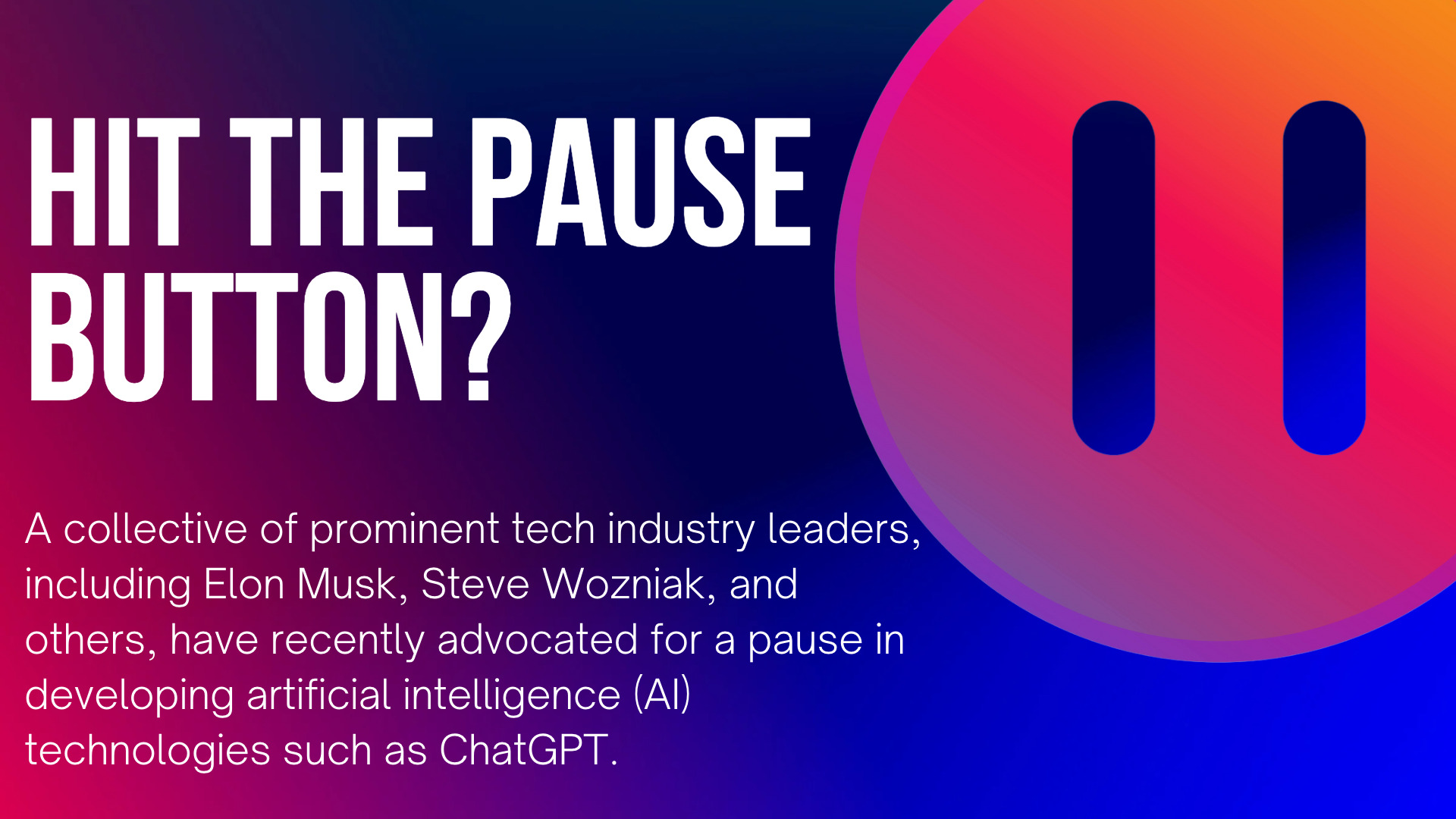
Emphasis on Addressing Ethical Concerns and Regulatory Oversight
A collective of prominent tech industry leaders, including Elon Musk, Steve Wozniak, and others, have recently advocated for a pause in developing artificial intelligence (AI) technologies such as ChatGPT. Concerned by the swift advancements in AI, these visionaries emphasize the need to establish regulatory frameworks and carefully examine ethical implications before continuing further development.

Finding Equilibrium Between Technological Progress and Ethical Responsibility
Tesla and SpaceX CEO Elon Musk, Apple co-founder Steve Wozniak, and several other esteemed tech experts have come together to call for a temporary halt on AI and ChatGPT development. The group maintains that a moratorium on AI research is essential for allowing time to devise comprehensive guidelines, arguing that these measures are necessary to avoid potential misuse or unintended consequences.
While these tech leaders recognize the immense potential of AI to transform and enhance various industries, they insist that safety and ethical considerations must be weighed alongside innovation. The joint statement reads, “Our priority should be to ensure that these technologies are developed responsibly and in a manner, that benefits all of humanity.”
Assessing Potential Risks and Unanticipated Ramifications
The joint statement highlights the possible hazards of unregulated AI development, such as biased algorithms, privacy erosion, misinformation dissemination, and autonomous weapons creation. The tech leaders express concern that these technologies could aggravate existing societal issues if not properly regulated.
Furthermore, they caution that AI could lead to widespread displacement of human labor, resulting in unemployment and social instability. As a result, the group urges for an urgent reevaluation of AI development, asserting that a pause would allow engaging in constructive dialogue and devising suitable regulations.
Global Discourse on AI Ethics and Regulatory Measures Intensifies
The call for a pause on AI and ChatGPT development has ignited a worldwide discussion on the importance of ethical guidelines and regulatory frameworks within the AI industry. Governments, academic institutions, and tech companies now grapple with the intricate task of balancing innovation with the potential risks arising from rapidly advancing technologies.
It remains uncertain whether a temporary halt to AI development will be implemented. However, the call for responsible AI research from industry heavyweights like Musk and Wozniak has unquestionably drawn attention to the ethical challenges awaiting resolution.
Collaboration and Transparency as Key Factors in AI Governance
As the tech leaders call for a temporary halt to AI development, they emphasize the significance of cooperation among tech companies, governments, and academia in formulating robust governance frameworks. The group acknowledges the necessity for a multi-stakeholder approach, ensuring that AI regulations are informed by diverse perspectives and expertise.
Experts argue that fostering stakeholder collaboration can lead to the development of well-informed policies and more effective oversight mechanisms. By doing so, they aim to address potential risks and establish guidelines that promote ethical and responsible development for AI technologies.
Noteworthy Initiatives on AI Ethics and Guidelines
Several initiatives have sought to establish ethical guidelines and best practices for AI development in recent years. The Asilomar AI Principles and the European Commission’s Ethics Guidelines for Trustworthy AI are notable examples. These initiatives have provided a foundation for responsible AI development by outlining key principles such as transparency, fairness, accountability, and human oversight.
However, critics contend that these guidelines lack the necessary enforcement mechanisms to ensure compliance, underscoring the need for stronger, legally binding regulations.
AI Legislation and Policy Begin to Take Shape
With the conversation around AI ethics and regulation gaining momentum, governments worldwide are starting to take action. Some countries have already started crafting legislation to address AI-related challenges, including data protection, privacy, and transparency.
For instance, the European Union has been a leader in AI regulation with its proposal for a legal framework on AI, aiming to establish rules that ensure AI systems are used safely and respect fundamental rights. Simultaneously, the United States has initiated discussions on AI policy through the National Artificial Intelligence Initiative Act, coordinating research and development efforts across federal agencies.
While the push for AI regulation is crucial for addressing potential risks, some experts caution that overly restrictive regulations could stifle innovation and impede progress in the field. They argue that policymakers must balance fostering responsible AI development and enabling the rapid advancements needed to maintain a competitive edge.
As the debate surrounding AI ethics and regulation continues to evolve, it is clear that industry leaders like Elon Musk and Steve Wozniak have succeeded in bringing this critical issue to the forefront of global discussions. However, the question remains whether a temporary halt in AI development will be the catalyst required to drive the establishment of comprehensive regulatory frameworks that can guide the future of this rapidly developing technology.
Public Awareness and AI’s Role in Society
The call for a temporary halt on AI development by influential tech leaders has also propelled discussions around the technology’s role in society. Public perception of AI is multifaceted, with many individuals enthusiastic about its potential benefits. In contrast, others voice apprehension regarding its impact on job security, privacy, and other aspects of daily life.
Increasing public awareness of the realities and implications of AI is critical to fostering informed debates and ensuring that the technology is developed and implemented in ways that align with societal values. Many experts argue that open and transparent dialogue between AI developers, policymakers, and the general public is vital to dispelling misconceptions and building trust in AI technologies.
The Importance of AI Ethics Committees
One possible solution to address ethical concerns surrounding AI is the establishment of dedicated ethics committees within tech companies and research institutions. These committees, consisting of multidisciplinary experts, can help guide AI development by providing ethical oversight, reviewing AI applications, and offering recommendations for improvements.
Several organizations, such as Google’s AI Ethics Board and OpenAI’s external partnerships, have already embraced this approach, recognizing the importance of ethical guidance in AI technology development.
The Future of AI and ChatGPT Development
Industry leaders’ call to pause AI and ChatGPT development underscores the growing need to address the ethical challenges associated with rapidly advancing AI technologies. As governments, academic institutions, and tech companies grapple with these issues, a consensus on the necessity of comprehensive regulatory frameworks and ethical guidelines is emerging.
The future of AI and ChatGPT development will require a delicate balance between innovation and regulation. Through collaboration, open dialogue, and careful consideration of ethical implications, stakeholders can work together to create a future where AI technologies are developed and deployed responsibly, maximizing their potential to benefit humanity while minimizing risks and unintended consequences.
In the meantime, the tech industry and policymakers must heed the warnings of visionaries like Elon Musk and Steve Wozniak, who have emphasized the need for caution and responsibility in AI development. As AI continues to reshape industries and societies worldwide, the imperative to ensure the technology’s safe and ethical development has never been more pressing.
Contents
- 1 Emphasis on Addressing Ethical Concerns and Regulatory Oversight
- 2 Finding Equilibrium Between Technological Progress and Ethical Responsibility
- 3 Assessing Potential Risks and Unanticipated Ramifications
- 4 Global Discourse on AI Ethics and Regulatory Measures Intensifies
- 5 Collaboration and Transparency as Key Factors in AI Governance
- 6 Noteworthy Initiatives on AI Ethics and Guidelines
- 7 AI Legislation and Policy Begin to Take Shape
- 8 Navigating the Balance Between Innovation and Regulation
- 9 Public Awareness and AI’s Role in Society
- 10 The Importance of AI Ethics Committees
- 11 The Future of AI and ChatGPT Development



